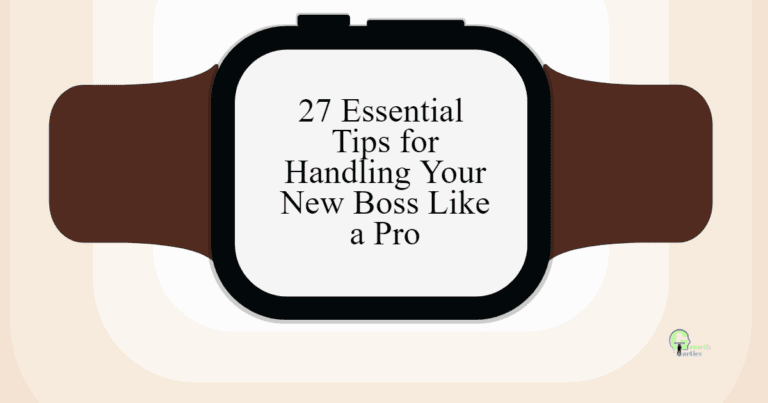Starting a new job or dealing with management changes can be an exciting and challenging experience, especially when it comes to dealing with a new boss.
Whether you’re transitioning into a new role within the same company or starting fresh at a new job, establishing a positive and productive relationship with your new manager is essential for your success. In this article, we will provide you with 27 essential tips on handling your new boss like a pro.
Jump To Section
Building a Strong Relationship with Your New Boss
1. Get to Know Your New Boss
The first step in establishing a good relationship with your new boss is to take the time to get to know them. Learn about their background, experience, and management style. Understanding their strengths and weaknesses will help you navigate your working relationship more effectively.
2. Understand their Expectations
Every manager has their own set of expectations for their employees. Take the initiative to clarify what your new boss expects from you in terms of performance, goals, and responsibilities. This will ensure that you start off on the right foot and can meet or exceed their expectations.
3. Be Open-Minded and Coachable
Approach your new boss with an open mind and a willingness to learn. Be receptive to their feedback and guidance. Demonstrating a coachable attitude will show your boss that you are committed to improving and growing in your new role.
4. Communicate Effectively
Clear and effective communication is key to building a successful working relationship with any boss. Keep your boss informed about your progress, challenges, and achievements. Be proactive in asking for clarification when needed and provide regular updates on your projects.
5. Support Your New Boss
Support your boss by being a reliable and dependable employee. Be proactive in offering assistance, taking on additional responsibilities, and demonstrating your commitment to the team’s success. This will help you build trust and earn the respect of your new manager.
Handling Meetings with Your New Boss
1. Prepare for Meetings
Before meeting with your new boss, make sure to adequately prepare. Review your projects, goals, and any relevant information. Come prepared with questions and suggestions to make the most of your meeting time.
2. Share Your Insights and Ideas
Take the opportunity to contribute your insights and ideas during meetings with your boss. Show them that you are actively engaged and invested in the success of the team and the organization as a whole.
3. Actively Listen and Take Notes
During meetings, actively listen to your boss’s instructions, feedback, and suggestions. Take notes to ensure that you capture all the important information. This will demonstrate that you value their input and are committed to implementing their guidance.
4. Ask for Feedback and Clarifications
Don’t hesitate to ask for feedback and clarifications during and after meetings with your boss. Seek their advice on how you can improve and ask for specific examples of what they are looking for. This will show your boss that you are dedicated to your professional development.
5. Follow Up on Action Items
After meetings, follow up on any action items assigned to you by your boss. Take ownership of your responsibilities and ensure that you complete them in a timely manner. This will demonstrate your reliability and commitment to meeting deadlines.
Dealing with Changes and Transition Under New Leadership
1. Embrace Change and Adapt
When starting with a new boss, it’s important to embrace change and be willing to adapt to new ways of doing things. Be open to new ideas, processes, and approaches that your new boss brings to the table.
2. Avoid Comparing Your New Boss to the Previous One
Each manager has their own unique style and approach. Avoid making comparisons between your new boss and your previous one. Instead, focus on understanding your new boss’s expectations and adapting to their management style.
3. Get to Know Your New Workplace
Take the time to familiarize yourself with the dynamics of your new workplace. Learn about the company culture, the team dynamics, and the procedures in place. Understanding the context of your new environment will help you navigate your new role more effectively.
4. Set Clear Goals and Targets
Work with your new boss to establish clear goals and targets for your role. This will provide you with a clear roadmap and ensure that you are aligned with your boss’s expectations. Regularly track your progress and make necessary adjustments to stay on course.
5. Allow Time for Adjustment
Adjusting to a new boss takes time. Give yourself and your boss time to get to know each other and build a strong working relationship. Be patient with the process and focus on continuous improvement.
Setting a Good Impression and Embacing Professionalism
1. Make a Good First Impression
First impressions matter. Make sure to present yourself professionally from day one. Pay attention to your appearance, punctuality, and overall demeanor. Show your new boss that you are serious about your role and committed to making a positive impact.
2. Present Yourself Professionally
Maintain a high level of professionalism in all your interactions with your new boss. This includes your communication style, email etiquette, and behavior in the workplace. Demonstrate respect for your boss’s position and maintain a positive and professional attitude.
3. Avoid Office Politics and Gossip
Steer clear of office politics and gossip, especially when dealing with a new boss. Focus on building positive relationships with your colleagues based on trust and respect. Your professionalism will be noticed and appreciated by your new boss.
4. Be Patient and Exercise Empathy
Adjusting to a new boss can be challenging for both parties involved. Be patient with yourself and your boss as you navigate this transition. Exercise empathy and try to understand their perspective and challenges. This will help you build a stronger and more empathetic working relationship.
5. Be Mindful of Feedback and Criticism
Be open to feedback and constructive criticism from your new boss. View it as an opportunity for growth and improvement. Listen carefully, ask questions for clarification, and take action to address any areas of improvement identified by your boss.
What to Do If You Don’t Get Off on the Right Foot with Your New Boss
Sometimes, despite our best efforts, we may not initially click with our new boss. It could be due to misunderstandings, mismatched expectations, or simply different personalities. However, it’s crucial not to let this discourage you. With the right approach, you can still salvage the situation and build a positive working relationship. Here are some steps to take if you find yourself in this situation:
1. Reflect on the situation
Take a step back and objectively evaluate the dynamics between you and your new boss. Try to understand why the initial connection was not established and pinpoint any areas where you might have contributed to the issue.
2. Seek feedback
Schedule a meeting with your boss to discuss your performance and areas for improvement. Be open to receiving feedback and use it as an opportunity for growth. This conversation can provide valuable insights into their expectations and help you align your actions accordingly.
3. Communicate openly
Approach your boss with honesty and transparency. Share your concerns about the strained relationship and express your desire to improve the situation. Be ready to listen to their perspective and be open to finding common ground.
4. Take initiative
Show initiative by going above and beyond in your work. Identify areas where you can add value and contribute to your team’s goals. By demonstrating your commitment and dedication, you can potentially change your boss’s perception of you.
5. Build rapport
Invest time and effort into building rapport with your new boss. Look for opportunities to connect on a personal level, such as discussing shared interests or participating in team-building activities. A positive relationship outside of work can often translate into a better professional relationship.
6. Adapt your approach
Consider adjusting your working style to better align with your boss’s expectations. Pay attention to their communication preferences, decision-making process, and work style. By adapting and meeting their preferences, you can bridge the gap and foster a more effective working relationship.
7. Seek guidance
If you’re still struggling to connect with your boss, reach out to a mentor or trusted colleague for advice. They may offer insights and strategies for navigating challenging situations and provide support as you work towards improving your relationship with your boss.
Remember, building a strong relationship with your boss takes time and effort. Keep an open mind, remain adaptable, and continuously strive for improvement. By taking these proactive steps, you can turn a challenging start into a positive and productive working relationship with your new boss.
Final Thoughts on How to Deal With a New Boss
Handling a new boss can be a daunting task, but by following these 27 essential tips, you can navigate this transition like a pro. Remember, building a strong working relationship with your new boss takes time and effort. Be proactive, communicate effectively, and maintain a high level of professionalism. With these strategies, you will not only handle your new boss with ease but also thrive in your new role.


